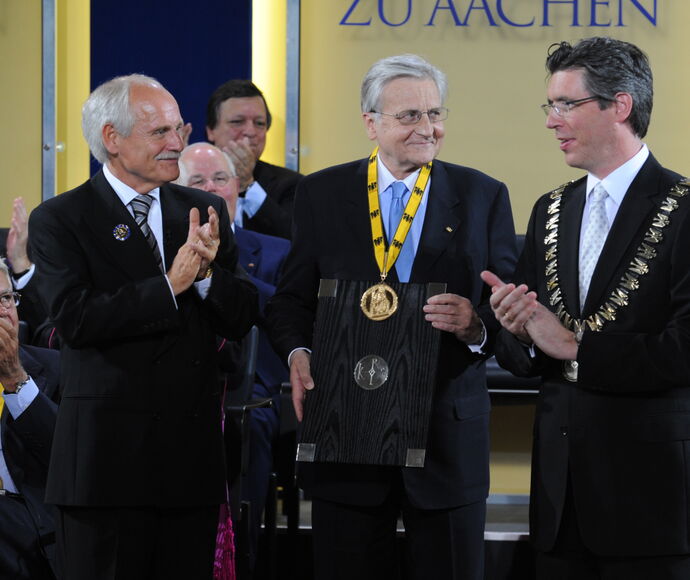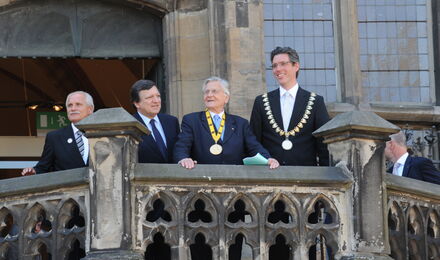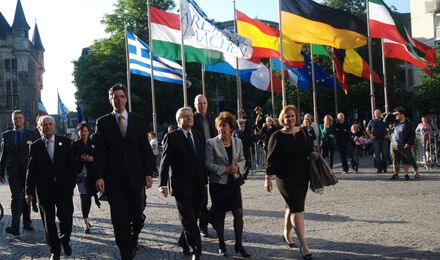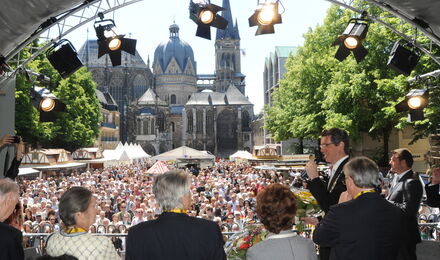Award of the International Charlemagne Prize of Aachen to the President of the European Central Bank, Dr. h.c. Jean-Claude Trichet
The euro is in danger.
‘If the euro fails, then Europe fails’ (Chancellor Dr. Angela Merkel). The awarding of the International Charlemagne Prize of Aachen 2011 sends the signal that the survival of the European Monetary Union and a stable euro are to be secured. The euro is a success story, and the effects of the financial crisis would have been far more dramatic without the monetary union and without the European Central Bank (ECB). A return to national currencies is not a viable option.
The European Central Bank has kept the promise of stability made by the founders of the euro. Since the introduction of the euro, the ECB, and above all its President Jean-Claude Trichet, has proved to the well over 300 million citizens of the eurozone that they can trust their currency. Even in times of crisis, the Board of Directors of the Society for the Conferring of the International Charlemagne Prize of Aachen has confidence in the measures taken by the ECB and its strong president.
The euro has great significance for the world economy and other currencies, beyond the eurozone.
In 2002, the Charlemagne Prize Board of Directors honoured the significant joint achievement that is the euro. Today, it is important to honour the personality who has been committed to its stability for many years.
In appreciation of his outstanding services to the cohesion of the monetary union and the maintenance of the competitiveness of the European single market as the foundation of our prosperity and social security, the Board of Directors of the Society for the Conferring of the International Charlemagne Prize of Aachen honours the President of the European Central Bank, Dr. h.c. Jean-Claude Trichet, in 2011.
Jean-Claude Trichet stands for the independence of the European Central Bank. ‘The Central Bank will always live up to its responsibility. Because anyone who jeopardises price stability is jeopardising Europe.’ In just two sentences, Trichet vividly expresses what both drives and motivates him. For him, who has helped to shape the birth of the single currency from the outset, the euro is not just a means of payment, but a precious asset, a currency of peace for a Europe that was still in ruins just 65 years ago.
Jean-Claude Trichet was born on 20 December 1942 in Lyon. After attending school in Paris, he graduated from the Mining Academy in Nancy in 1964 as an ‘ingénieur civil des mines’. In 1966, he obtained a diploma in political science and a degree in economics in Paris; he then gained his first professional experience as an engineer in the private sector. From 1969 to 1971, he attended the elite school ENA.
In 1971, he joined the audit department at the Ministry of the Economy and Finance. In 1974, he initially worked as a consultant in the Inspectorate General of Finance, before moving to the Treasury the following year – the hub of French monetary policy. In 1978, he was appointed as an advisor for industry, energy and research in the General Secretariat of the then President Valéry Giscard d'Estaing. When François Mitterrand became president, he returned to the Treasury in 1981, and took over its management in 1987. In the period that followed, he represented France at the World Bank, the International Monetary Fund and in the negotiations on economic and monetary union, among other things. Looking back, he says that many call him the ‘father of the euro’: ‘Even then, I had the feeling that I was working on something great in an historical sense.’ (WamS, 20 June 2010)
In October 1993, he became Governor of the Banque de France, which had only a few months earlier been granted independence by the government. In this capacity, he was instrumental, together with Hans Tietmeyer, then President of the Deutsche Bundesbank, in preparing for the introduction of the euro as part of European Economic and Monetary Union. His formal confirmation in the governorship in 1999 was a mere formality. A year earlier, the heads of state and government of the EU member states had already informally agreed that the Frenchman should succeed the first President of the ECB, Wim Duisenberg, at a date yet to be specified. After the latter had announced his resignation, Trichet was officially nominated in June 2003. On 1 November of the same year, he took up his eight-year term as President of the European Central Bank.
During his time at the helm of the Banque de France, he was already being called the ‘Ayatollah du franc fort’ or the Bundesbank's ‘clone’, Trichet subsequently proved to be the guarantor of the European Central Bank's independence; for example, in 2004, when he resisted pressure from the German and French governments to lower interest rates, and in December 2005, when he raised the key interest rate against the will of ten governments in the eurozone. Earlier than any other central bank, the ECB had recognised the emergence of the global crisis in early August 2007, just before the US real estate bubble burst. It then made available additional liquidity to the money markets on an extraordinary scale to ensure financial stability. It counteracted the downturn by cutting key interest rates to a record low level and, with its immediate monetary policy responses, especially in the period immediately following the Lehman bankruptcy, when the fiscal policy countermeasures and support measures had not yet been launched, it made a decisive contribution to slowing and ultimately halting the downward momentum in the financial system and the real economy.
‘It is no coincidence that during the turbulence of recent years, it was primarily the ECB that was able to enhance its reputation among experts, while the Fed and, in particular, the seemingly helpless Bank of England lost standing. The ECB has a pragmatic monetary policy concept that is not bound by any dogma, but is nonetheless reliable’ (FAZ, 15 January 2010).
Despite his avowed intention of preventing a permanent intermingling of monetary and fiscal policy, Trichet also displayed a high degree of pragmatism when it came to involving the ECB in the protective umbrella that was thrown over the euro at the beginning of May. He pushed through the purchase of government bonds from crisis-hit eurozone countries despite harsh criticism. The Frenchman confidently countered accusations that he had broken a taboo in response to political pressure: ‘No line has been crossed. Our line is price stability, and our credibility is based on achieving this goal. [...] We do not buy government bonds to inject money into the markets – unlike other central banks. We do something else: our monetary policy course remains unchanged. That is why we are siphoning off all the liquidity that has been injected’ (FAZ, 22 May 2010).
Some observers even interpreted the negotiations on the rescue package the other way round: ‘It was not Trichet who was put under pressure by the heads of government, but he put them under pressure to act, thus filling a vacuum. Mr Euro suddenly became Mr Europe’ (Berliner Morgenpost, 20 June 2010).
In any case, the ECB president does not shy away from openly calling for action in the member states: ‘As regards fiscal policy, there is clearly a need to strengthen public confidence in the ability of governments to return to sustainable public finances [...] and thus support sustainable growth in the medium term. To this end, it is essential that countries design credible multi-year consolidation plans and fully implement the envisaged consolidation measures. [...] The immediate implementation of far-reaching structural reforms is indispensable to improve the prospects for higher sustainable growth. In particular, comprehensive reforms are needed in those countries that have suffered a loss of competitiveness in the past or are currently affected by high budget and foreign trade deficits.’ (ECB press conference, 4 November 2010)
For Trichet, it is particularly the fiscal policy of some countries that needs to be addressed. The state of many public finances is dire. Under these conditions, Trichet pursues a monetary policy that keeps the euro strong, thereby creating confidence among citizens and investors. For him, the Stability and Growth Pact is at the heart of monetary union.
Former German Chancellor Helmut Schmidt, one of the fathers of the European Monetary System, recently stated: ‘Of all the European authorities, only the European Central Bank under Jean-Claude Trichet has been flawless so far’ (Die Zeit, 12 May 2010).
‘Trichet is a man of action, of negotiation, of diplomacy. He has no reservations and is not afraid to break new ground if it serves to solve a problem. He has been fighting unrest in the financial markets for three decades. [...] The career official has learned one lesson from the great crises of the past: When the markets are in turmoil, they can only be calmed by swift and decisive action’ (Die Zeit, 12 May 2010). At a time when the European Union is facing challenges of historic proportions, Jean-Claude Trichet has done just that: he has calmed the increasingly unstable atmosphere on the global markets and created confidence by taking considered, swift and decisive action. Perhaps that is why US Treasury Secretary Geithner said of the ECB President on the fringes of this year's G20 summit: ‘When I look around here, he is the giant.’
The policy of the European Central Bank is a commitment to the social market economy. In this way, it promotes economic growth and stability throughout Europe that is in line with the Lisbon Treaty.
In the President of the European Central Bank, Dr. h.c. Jean-Claude Trichet, the Board of Directors of the Society for the Conferring of the International Charlemagne Prize of Aachen honours in 2011 a European civil servant who has rendered outstanding services in difficult times to the cohesion of the monetary union, the stability of the euro and the preservation of Europe's competitiveness.
With the award of the prize, the Board of Directors of the International Charlemagne Prize is calling on European politicians to dare to realise a political union that effectively coordinates economic, financial and budgetary policy in the euro area.













